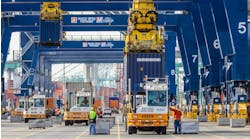Con-way Freight Cuts Transit Times to 460 U.S. Destinations
Less-than-truckload (LTL) carrier Con-way Freight has launched a major network re-engineering that will cut transit times by one day to 460 U.S. destinations, while decreasing the company’s carbon footprint. The initiative, it is hoped, will also lead to reduced re-handling and fewer service exceptions, improved on-time delivery and a more efficient operation. Major lanes affected include those between Southern Texas and the Northeast, Chicago and Southern Florida, and Chicago and Southern Texas.
“At Con-way Freight, we’re always looking for ways to improve service performance for our customers and lessen our impact on the environment. Now, advanced technology has enabled us to continuously evaluate ways to move freight more efficiently and directly from origin to destination, reducing miles, handling and fuel consumption along the way,” said Greg Lehmkuhl, executive vice president of operations, Con-way Freight. “This network re-engineering will reduce transit times for our customers, while helping them control inventory, manage supply chain costs and ultimately get product to market faster.”
This network re-engineering initiative aims to improve density over the shortest, most direct routes and will allow Con-way Freight to reduce total operating miles per year by 16.6 million. The move will enable the company to conserve a projected 2.6 million gallons of diesel fuel annually, eliminating approximately 58.6 million pounds of carbon emissions from the environment, which is equal to removing more than 5,200 automobiles from America’s highways.
Previously, Con-way Freight implemented several other operating refinements which have led to sustainability benefits. In early 2008, the company turned back the engine speed governors of its trucking fleet from 65 to 62 mph. This action reduced diesel fuel consumption by nearly 3.2 million gallons annually while removing approximately 71 million pounds of carbon emissions from the environment — the equivalent to taking some 6,400 automobiles off the nation’s roads.
Additionally, an earlier network re-engineering initiative implemented in late 2008 achieved operating efficiencies and service and sustainability benefits, reducing total miles driven annually by more than 31 million. The reduced miles equated to a reduction in carbon emissions of more than 100 million pounds, which would equate to the removal of more than 9,900 cars from the U.S. road system.
To create the network re-engineering, a cross-functional team used advanced simulation modeling technologies and business intelligence tools to pinpoint opportunities to maximize service performance, efficiency and asset utilization. In the Northeast to Southern Texas lanes, for example, the team engineered network changes to yield a 20% reduction in handling and a decrease in transit times from four to three days, a 25% improvement.
“The changes made possible through our predictive modeling technology are part of a long-term approach to continuous improvement and optimized network design that maximizes the use of our existing infrastructure,” says Greg Lehmkuhl, executive vice president of operations, Con-way Freight.


